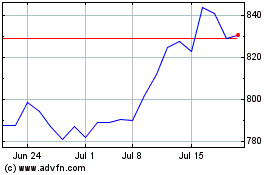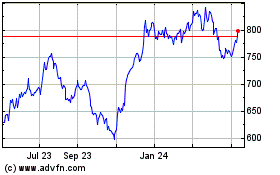BlackRock Pulls In More Assets But Price Pressure Damps Profit -- WSJ
July 20 2019 - 3:02AM
Dow Jones News
By Dawn Lim
This article is being republished as part of our daily
reproduction of WSJ.com articles that also appeared in the U.S.
print edition of The Wall Street Journal (July 20, 2019).
BlackRock Inc.'s second-quarter profit fell about 7% as the
money-management giant was squeezed by price pressures.
A torrent of investor money and a rising U.S. stock market
helped lift BlackRock's assets to $6.8 trillion. Net inflows into
the firm rose more than sevenfold to over $150 billion.
BlackRock took in a surge of money into bond strategies and its
iShares exchange-traded funds roughly doubled net inflows to over
$36 billion.
The world's biggest money manager helped steer a revolution in
financial markets with exchange-traded funds that trade rapidly and
index funds that track markets cheaply. But BlackRock's results
show how in the hypercompetitive industry, an influx of assets
doesn't always translate to higher profits.
The prices of the most commonly offered strategies are falling
near zero. Rival State Street Corp. also reported earnings on
Friday. The firm's investment management arm posted higher
second-quarter assets under management from a year ago but its
revenue fell.
The rise and fall of markets compounded price pressures for
BlackRock.
As U.S. stocks rose, so did assets in cheaper products that
track those markets. Meanwhile, a fall in other equity markets
outside the U.S. reduced assets -- and fees BlackRock could charge
-- on more lucrative strategies.
BlackRock Chief Executive Laurence Fink is pushing to make the
firm less exposed to how investors direct their money and the ebb
and flow of markets. The firm is a financial superstore that
provides everything from bond-picking funds to workplace retirement
products and technology for Wall Street.
"I have to focus on what we can control," Mr. Fink said in an
interview. "And what we can control is the diversity of our
investment platform."
The firm earned $1 billion, or $6.41 a share, in the second
quarter on revenue of $3.5 billion. Earnings and revenue fell from
a year ago and missed analyst expectations.
In the latest quarter, investment advisory, administration fees,
and securities lending revenue fell by 1.4%. The firm said price
changes to some products and lower securities lending revenue also
offset the boost in assets.
Performance fees -- the money BlackRock gets for beating markets
in actively managed strategies -- fell about 30%.
Technology-services revenue rose 20%, reflecting higher revenue
from BlackRock's acquisition of French software firm eFront. The
transaction, the firm's largest acquisition by size in a decade,
added to technology tools BlackRock offers financial institutions
to measure risk. Its technology business helps smooth any swings in
markets and gives it new reach across the technology infrastructure
that connects Wall Street.
BlackRock, unlike rivals such as Vanguard Group, has no channel
of its own to directly distribute products to everyday investors.
But it is turning to other ways to influence the ecosystem of
wealth managers and advisers that oversee the money of individuals.
It has taken positions in a number of financial technology firms
with digital channels to reach consumers.
Chief Financial Officer Gary Shedlin told Wall Street analysts
Friday that BlackRock is looking to use its spare cash more
aggressively in partnerships with outside companies.
Total net flows rose to $150.99 billion in the quarter, up from
$20 billion a year earlier. Net flows are the difference between
investor money going into BlackRock and money leaving. The surge in
new cash into BlackRock comes after a 2018 slowdown of flows across
major asset managers raised investor concerns about whether their
growth engines were sputtering.
As BlackRock sucks in more assets, its power to influence
markets and responsibility as a shareholder across myriad companies
could face more scrutiny from academics, investors and some
regulators.
"People question the scale," said Mr. Fink. "Scale also allows
us to provide lower fees and better outcomes for investors."
On the firm's scale, he added, "I don't see it as a liability.
It's giving us broader and deeper conversations with more
organizations."
The changes in BlackRock's asset mix reflected shifting investor
sentiment.
BlackRock had record second-quarter flows in bond strategies as
investors and financial institutions made bond bets as the
likelihood of an interest-rate cut increased. Others were hedging
against a possible downturn in stocks as many major indexes reached
new records. Investors also surged into cash.
Net inflows into cash-management services increased more than
fourfold from the year ago period.
"Broadly, money going into lower fee products such as fixed
income and cash means the fees are under pressure for asset
managers," said Michael Cyprys, an analyst at Morgan Stanley.
--Allison Prang contributed to this article.
Write to Dawn Lim at dawn.lim@wsj.com
(END) Dow Jones Newswires
July 20, 2019 02:47 ET (06:47 GMT)
Copyright (c) 2019 Dow Jones & Company, Inc.
BlackRock (NYSE:BLK)
Historical Stock Chart
From Mar 2024 to Apr 2024

BlackRock (NYSE:BLK)
Historical Stock Chart
From Apr 2023 to Apr 2024
